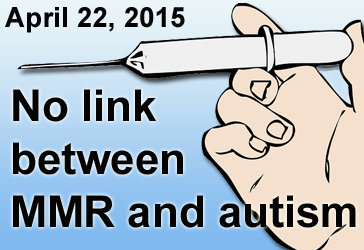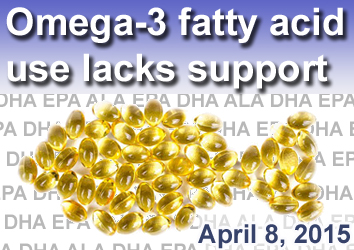Archives
April, 2015
Select a different month in the archive
New Study Finds No Link Between Autism and MMR
By Chelsea E. Toledo, M.A. on April 22, 2015

Background: Pediatricians recommend that children receive a vaccine to protect them from measles, mumps, and rubella (MMR) between 12 and 15 months of age, and then again between 4 and 6 years of age. However, the belief that these shots increase children’s risk of developing autism spectrum disorder (ASD) has contributed to a decrease in vaccination rates, threatening herd immunity.
What’s new: On April 21, 2015, the Journal of the American Medical Association published a large-scale study on the prevalence of ASD in vaccinated and unvaccinated children, all with older siblings—as children who already have a sibling with the disorder are considered to be at higher risk. The researchers looked at insurance claims data from 95,727 children between the ages of 0 to 5, 994 of whom had been diagnosed with ASD. They found that the risk of diagnosis was nearly identical for children who had been vaccinated versus those who had not. In addition, they determined that the risk of ASD did not increase following administration of MMR vaccines in children whose older siblings already had the disorder.
Why it’s important: This study adds to a wide body of research conducted over the past 15 years challenging the link between vaccines and ASD. The study also shed light on low vaccination rates among children whose older siblings had an ASD diagnosis—which the researchers attribute to the ongoing belief among affected families that vaccines led to their children’s ASD status.
Help me understand :
| Source(s) : |
| Tweet |
Omega-3 Fatty Acids Fail to Improve ASD Symptoms
By Shana R. Spindler, Ph.D. on April 8, 2015

Background: According to a 2006 study, nearly 30 percent of children with autism use some form of omega-3 fatty acid supplementation. Omega-3 fatty acids are a special type of polyunsaturated fatty acid. They are highly concentrated in fish (in the form of DHA and EPA) and some plants (in the form of ALA), but can be taken in pill or oil form too. Because DHA is a critical factor in brain growth and development, research groups have investigated if omega-3 fatty acid supplementation can improve ASD symptoms.
While several studies report a decrease in hyperactivity among children who take omega-3 fatty acid supplements, in no study was this correlation significant. Adding to the confusion, many studies were very small and lacked randomized, double blind controls. Yet, despite a lack of scientific evidence showing effectiveness, omega-3 fatty acid use remains a staple in the ASD complementary and alternative treatment toolkit.
What’s new: On March 21, 2015, the online journal Molecular Autism published a study on DHA plus EPA supplementation for children (two to five years of age) with ASD in a randomized, double blind, placebo-controlled study. The researchers found no significant difference in core or associated symptoms between children receiving DHA and EPA versus placebo. They did, however, find a significant worsening of externalizing behaviors in the DHA plus EPA group. The researchers hypothesize that exacerbation of underlying gastrointestinal issues in the omega-3 fatty acid group may account for the significant worsening of externalizing behaviors.
Why it’s important: This study clearly indicates the lack of significant correlation between omega-3 fatty acid supplementation and ASD symptom improvement. The study also suggests that omega-3 fatty acid supplementation may worsen externalizing behaviors in children with co-occurring gastrointestinal issues, but this observation requires replication before conclusions can be made.
Help me understand :
| Source(s) : |
| Tweet |

